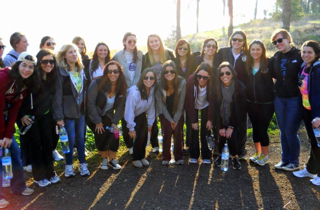Young Jews on university campuses across the country are highly supportive of Israel, a new study shows. The data, representing 400 Jewish undergraduate students, clearly shows a high level of connection with Israel, belying the supposed generational erosion of support in the American Jewish community. The survey was sponsored jointly by The Israel Project and the American Israeli Cooperative Enterprise, and conducted by Public Opinion Strategies.
Mitchell Bard, Executive Director of the nonprofit American Israeli Cooperative Enterprise (AICE) and co-founder of the research, further explains, “Contrary to the claims of some outspoken critics, young Jews do not feel alienated from Israel. Our survey found that Jews have very positive feelings toward Israel, see it as the spiritual center of the Jewish people; believe that caring about Israel is an important part of being Jewish, think American and Israeli Jews share a common destiny and agree American Jews should support the policies of the government and express any criticism privately.”
The question of closeness to Israel in this student survey intentionally mirrored the AJC’s annual survey of the national Jewish community, and found that the numbers for the two groups were almost identical. Among Jewish students, 66 percent say they feel close to Israel, compared to 68 percent of national Jews.
Another factor in closeness to Israel is campus involvement. Among those involved in a Jewish campus organization (a little over half of Jewish students), 78 percent feel close to Israel. But, among those not involved, the number drops to only 52 percent. In looking at the various organizations on campus, it is clear that Hillel has a dominant position in connecting with these young Jews; 48 percent of Jewish students say that they are involved with Hillel. The next organization on the list is in the single digits.
Jewish students use overwhelmingly positive language when asked for one word to describe Israel. Click here to see a word cloud of all the open-ended answers given on the survey.
Among the Jewish students, fully 47 percent of have been to Israel; 16 percent of have attended Birthright, and 13 percent have been on a teen tour. Having this many young Jews visit Israel before finishing college is a significant number because the AJC has found that only 44 percent of the national Jewish community has been to Israel. Of those Jewish students who have not been to Israel, three-fourths (73 percent) express a desire to visit. Having been to Israel is also a factor that shows a strong correlation to support for Israel, and an ability and willingness to speak to others on the issue.
Critically, the survey shows that 70 percent of Jewish students consider themselves well-enough informed on Israel to speak to non-Jews about the issue. But, only 44 percent say that they actually talk about Israel with non-Jews either a lot (7 percent) or some (37 percent). Jennifer Laszlo Mizrahi, founder and president of The Israel Project which co-funded the research says, “It is critical to get young Jews comfortable enough to speak about Israel that they can do so with their non-Jewish peers.”
Looking at the Israeli-Palestinian conflict in the political context of whom the United States should support, Jewish students again reaffirm their position with 84 percent saying it should be Israel. On a 0-to-100 scale, 89 percent of the Jewish students give Israel a ‘warm’ rating.
The top reasons why Jewish students say the U.S.A. should support Israel are due to shared values (43 percent) and due to Israel’s being the U.S.A.’s most important ally in the Middle East (37 percent). Also notable are their partnership in the fight against terrorism (27 percent) and their efforts for peace (23 percent). Less important reasons include religious justifications, and technological or economic achievements.
Among the Jewish students, mainstream media continues to play a significant role in shaping their views of the Middle East. But unlike non-Jewish populations, “family and friends” and “your own religious beliefs” also are a significant influence. This finding highlights the significance of the community in developing the next generation’s connection to, and information regarding, Israel.
Mizrahi says, “It is clear that we must continue to act as an educational resource for the mainstream media to ensure accurate and fair coverage of Israel. However, there is also a clear role that the community as a whole must play in educating our youth, and TIP is looking forward to working with organizations active in this field to strengthen communications targeted at our future community leaders.”
The survey was conducted online by Public Opinion Strategies from October 28 to November 20, 2011. Interviews of 400 self-identified Jewish students were collected. The margin of error is 4.9 percent.
Copyright © Acts News Network, Inc.

